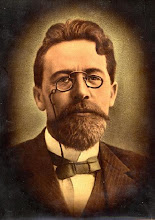What stuck out most to me in this story was a strong impression of grief, sorrow, anguish, and loneliness. These emotions were conveyed through powerful imagery and metaphors, and descriptions of the scene also added to this effect. This makes the emotions that are hidden deep within the character tangible and prominent in the environment. This story was very thought-provoking due to its succinct sentences and its powerful imagery and vivid scenes also caused me to feel very deeply for the character. It is a profound story about a profound loss and a profound suffering and it is an element of the story that so much is said by so little.
I found myself profoundly empathizing with this character as I knew and became aware of his anguished solitude and harrowing sorrow. Once I knew the depth of this character's suffering, which is expressed by precise sentences and images and metaphors each with deep meaning, conveying these profound feelings with masterful craftsmanship. The emotional state of Iona, though hidden on the exterior, once revealed gives the opening scene so much metaphorical meaning that the details presented are all chosen to convey or symbolize metaphorical reflections of Iona's immobility represented by the stillness of the subjects of the scene (despite the snow) and the layer of snow accumulating on everything is also a metaphor for the accumulation of his suffering. The snow can also be symbolic of the harshness and hostility of the pain from the absence of his dead son, represented by the harshness of the environment.
The metaphor of flowing misery is meant to to show that his misery engulfs him like it would engulf the world. (pg.14) Then, in the next metaphor he says he is so invisible and insubstantial that not even an excess of illumination could make him visible.(pg.14) This metaphor gives a strong impression of being lost in a feeling of a diminished state of non-existence, and the insignificant shell he refers to himself as is a symbolic expression of his grieving state. He is saying that he is empty and this emptiness is also another agony to him, because it does not alleviate his suffering, and causes him to suffer more. This metaphor means both that without his son he is nothing, and that he has also been reduced to nothing from suffering.
Iona is overcome with grief and utterly fallen and broken from this loss and he tries to seek comfort from anyone that exists he is so alone in his anguish. His dismissal by the house-porter is a painful rejection to him and this sends him into an abyss of hopelessness as he finds nothing to help him while he suffers deeply and isolated. His alienation is due to his untouchable grief which makes him feel so distant. He finds comfort in his horse, his only companion, which proves to be the best because it comforts him with its proximity, as it breathes on his hand and gives him that contact which he has been needing. The horse does not silence him or walk away, and its presence helps him on a very deep level.
Wednesday, February 3, 2010
Subscribe to:
Post Comments (Atom)

I thought you nailed a lot of the metaphors that Chekov invoked in this story. Many of them did not dawn on me until I read your interpretation. I would have liked for you to use more quotes to point out the specific places in the story where the metaphors surface. In the end I don't think he does fall into an "abyss of hopelessness" because he has companionship in the form of his horse. The last line lets me know know he is going to be okay by the way Chekhov wrote, "Iona is carried away and tells her all about it." All in all a very enlightening response. -Karen Thacker-
ReplyDeleteI LOVE your first paragraph. You put it into words very nicely! I agree with what you wrote in your response -But I think if the first 2 paragraphs were combined (changing the sentence order to make sense) would greatly enhance your writing and give justification to your claims.
ReplyDelete-Lauren
I really like all the metaphors you pointed out. I wanted to draw a stronger connection between how the setting impacted the mood and you nailed it with the snow and explaining how that was symbolic of Iona's Suffering. I would like to see what other metaphors you might have pointed out based on what you had mentioned. -Kyle
ReplyDelete